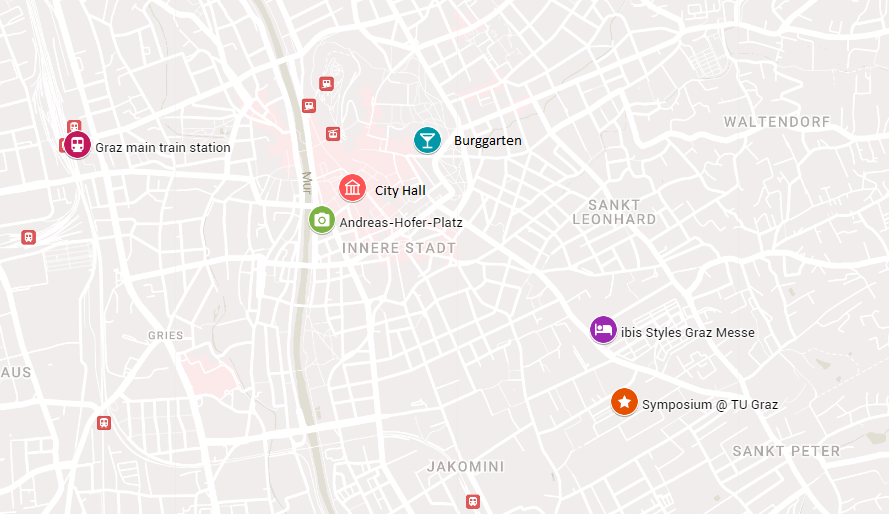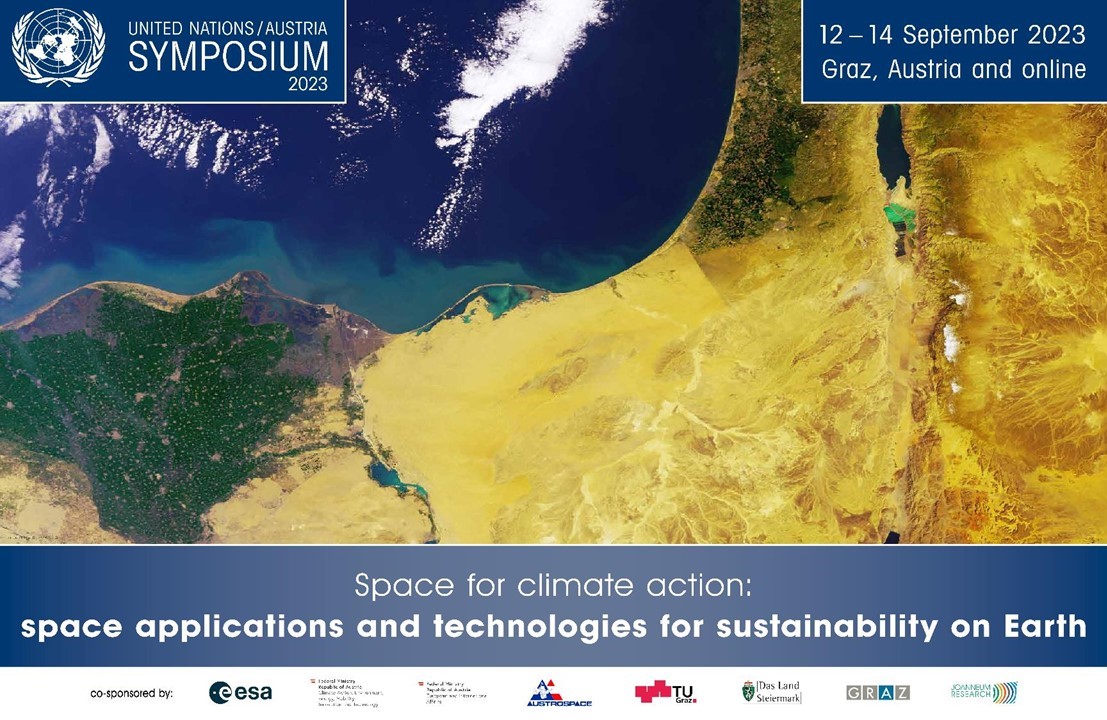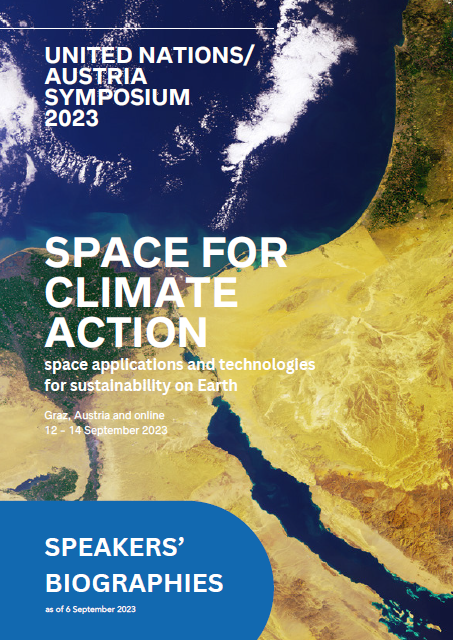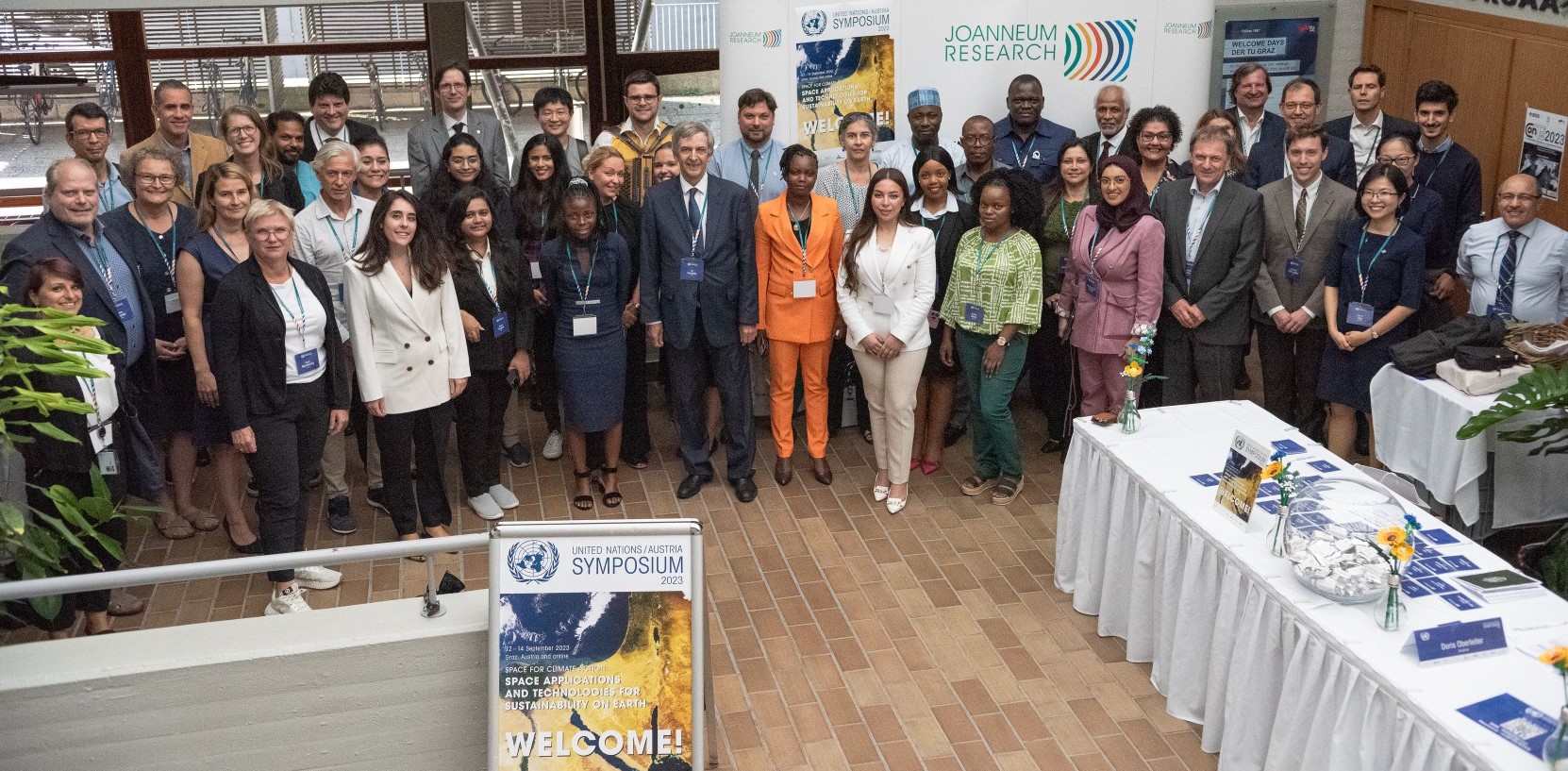UN/Austria Symposium 2023
Space for climate action:
space applications and technologies for sustainability on Earth
12-14 September 2023
Graz, Austria & Online
The event has closed.
Updates
- Download the final report here.
- Space for Climate Action free online trainings is still open for registration.
Theme
The 2023 UN/Austria Symposium "Space for climate action: space applications and technologies for sustainability on Earth" will take place from 12 to 14 September in Graz, Austria, as well as online.
This year's symposium is part of a series to discuss the important contributions of space applications and technologies in tackling the challenges of climate change. The focus of the symposium is to showcase the most recent initiatives, experiences and best practices in mitigating and adapting to climate change and supporting sustainability on Earth. This year's symposium will showcase country cases from Brazil, Slovenia and South Africa. Further to creating awareness of how Member States use space technologies, the symposium will highlight how the space sector is being adapted to reduce its own impact on the climate crisis through changes in space engineering practices and innovations, as well as regulatory incentives for their adoption. The symposium would collect ideas and contributions to define future activities.
To raise awareness of relevant space-related activities, services and cooperation programmes among different user groups, the symposium will gather government officials, the diplomatic community, UN and international agencies, private companies, academia, as well as NGOs.
Background
The UN/Austria Symposium has taken place in Graz, Austria, since 1994. It is an activity of the Programme of Space Applications of the United Nations Office for Outer Space Affairs. Since the first symposium entitled "Enhancing Social, Economic and Environmental Security through Space Technology", more than 3,917 participants have attended the events. They addressed a variety of themes, ranging from security to youth, as well as the use of space for sustainable development, space accessibility, and international cooperation. This year's symposium will be the 29th edition of this long-standing series.
The symposia series has provided a forum for discussion between the different stakeholder groups of the wider space community, including the diplomatic community, the private sector and academia, as well as UN entities. The main purpose of the symposia remains to enable discussions and learning on the use of space tools and applications, with an interdisciplinary viewpoint, addressing technology development and policymaking.
Since 2020, the symposium engages in a series focusing on using space technologies, data and applications to address the unprecedented challenges posed by climate change, and in support of the United Nations Sustainable Development Goal 13: Climate Action.
Objectives
The symposium has the following objectives:
- To promote the exchange of best practices and solutions to meet the demand and needs of developing countries in mitigating and adapting to climate change.
- To demonstrate how initiatives based on space applications have been successfully developed and implemented in different countries.
- To share experiences and explore how space-based services can be used to comply with or support policies about climate action according to national priorities, and how sustainability policies are being applied in the space sector.
- To present available toolboxes that have already been implemented through case studies or pilot projects at a country level to comply with regulations related to climate action, with the aim of encouraging the adoption of tested tools and approaches.
- To raise awareness of relevant space-related activities, services and cooperation programmes among different user groups, in particular government officials, the diplomatic community, UN and international agencies as well as NGOs.
- To report to the UN Committee on the Peaceful Uses of Outer Space through the Scientific and Technical Sub-committee.
Programme
The programme includes:
- Keynote presentations: Given by invited speakers.
- Sessions: Presenters will make a 15-minutes presentation followed by Q&A with the audience.
- Panels: Roundtables during which speakers give short introductory statements, followed by a moderated discussion among speakers and Q&A with the audience.
- Pitches: Short presentations introducing specific projects or initiatives in less than 5 minutes.
- Social events: Two evening receptions hosted by the Mayor of Graz and the Governor of Styria, as well as a guided tour of the city of Graz.
Programme
Note: Click on the title to download presentation slides.
|
||||||||||||||||||||||||||||||||||||||||||||||||||||||||||||||||||||||||||||||||||||||||||||||||||||||||||||||||||||||||||||||||||||||||||||||||||||||||||||||||||||||||
| Day 3 - Thursday, 14 September 2023 | |||
| Morning session | |||
| 9:50 | Webex connection opens | ||
| 10:00 | Welcome | ||
|
10:05
|
Country case 3: Slovenia | ||
| The session will present how Slovenia is using space applications to support its policy development against climate change and the concrete implementation of innovative projects using space applications. | |||
| Moderator | Niklas Hedman | UNOOSA | |
| Slovenia: National policies and space eco-system supporting climate change | Tanja Permozer | Ministry of the Economy, Tourism and Sport | |
| Nemo-HD satellite data and digital twins of SDG hotspots
|
Tomaž Rodič | SPACE-SI | |
| Nemo-HD microsatellite and ground station infrastructure for agile acquisitions of multispectral data and video
|
Ana Urbas | SPACE-SI | |
| Future seasonal rainfall patterns and impact on landslide prone areas in Slovenia
|
Mateja Jemec Auflic | Geological Survey of Slovenia | |
| Use of Earth Observation data for enforcement of sustainable agriculture: Good practice from EU Common Agriculture Policy | Grega Milcinski | Sinergise d.o.o., Slovenia | |
| 11:30 | Break (30 minutes) | ||
| 12:00 | Panel 3: Recommendations for future activities | ||
| Moderators | Markus Woltran; Andrea Kleinsasser | UNOOSA; Austrian Federal Ministry for Climate Action, Environment, Energy, Mobility, Innovation & Technology | |
| Maximilian Bauernfeind | European Union Agency for the Space Programme | ||
| Adriana Cursino Thomé | Ministry of Science, Technology and Innovation, Brazil | ||
| 12:45 | Conclusion of the Symposium | ||
| 13:00 | Close | ||
Download
<<Speakers' biographies
Dates and Venue
The symposium will be held from 12 to 14 September 2023 in Graz, Austria, as well as online via Webex. The venue is Graz University of Technology, Inffeldgasse 12, 8010 Graz, Austria.
Expected Participants
The symposium is aimed at members of the diplomatic community, intergovernmental and non-governmental organisations, research and development institutions, policy and decision-makers, senior experts, scientists, engineers and university educators, especially from developing countries.
Representatives from the various permanent missions of United Nations Member States in Vienna will be invited to the symposium, along with representatives from various United Nations agencies and other international organisations, with the aim of promoting dialogue not only between policy-makers but also with the private sector and end-users. Representatives from the space applications industry are also welcome to attend and present their solutions.
The Office for Outer Space Affairs is committed to supporting gender mainstreaming in its programmes and advocates for balanced representation from different perspectives.
Registration
Registration has closed.
Post-Symposium training courses
Following the Symposium, UNOOSA is partnering with the Canadian Space Agency (CSA), the European Centre for Medium-Range Weather Forecasts (ECMWF), the European Union Agency for the Space Programme (EUSPA), the National Aeronautics and Space Administration Applied Remote Sensing Training Programme (NASA ARSET) and other organisations to provide a variety of training courses under three broad themes: (1) satellite navigation, (2) Earth Observation data for climate action and (3) entrepreneurship. These online courses aim to raise awareness of how space applications support climate action and to enhance participants' capabilities to use them, as well as support budding entrepreneurs in developing a sustainable business plan around climate action.
The trainings are delivered by subject matter experts and are conducted exclusively online. Some trainings include demonstrations using open-source data and software. Some trainings consist of both theory and practical applications to consolidate the concepts learnt. By providing collaborative and interactive learning platforms, the trainings aim to connect participants from across the globe with experts and encourage exchange and flow of knowledge and ideas. Please click on the link below to find out more about the courses and registration.
Find out more about the courses here
Practical information for in-person attendance
> SYMPOSIUM VENUE
The symposium will take place at Graz University of Technology, Institute of Communication Networks and Satellite Communications, in Lecture Hall I 2, on the ground floor.
Graz University of Technology
Institute of Communication Networks and Satellite Communications
Lecture hall I 2 (access from Sandgasse 38)
Inffeldgasse 12
8010 Graz, Austria

> HOW TO GET TO THE SYMPOSIUM VENUE
Arrival by car
- From north or south: via A9 Phyrn-Autobahn until junction Graz-West, then A2 Südautobahn in direction Vienna, further see below
- From east or west: A2 Südautobahn to junction Graz-Ost, then feeder road to exit Graz-Liebenau, then right into Münzgrabenstraße, approximately 2km, then right into Sandgasse to parking lot Sandgasse 38
Arrival by plane
- Nearest airport: Graz-Thalerhof: the journey by cab takes about 30 min.
Arrival by train
- Nearest train station: Graz-Hauptbahnhof: take tram line 6 in the direction of St. Peter to the station Schulzentrum St. Peter. Then walk along Inffeldgasse (west) to the campus. The institute (Inffeldgasse 12) is located on the right, northern side behind the new study center.
> ACCOMMODATION
Participants are encouraged to book their hotel room at Ibis Styles Graz Messe.
> MEALS
Lunches on day 1 and 2 of the symposium will be provided at the canteen in the Graz University of Technology. In the evening of day 1, there will be a reception hosted by the Mayor of Graz at the City Hall. In the evening of day 2, there will be a reception hosted by the Governor of Styria at the Orangerie at the Burggarten. Lunches and receptions are offered to all in-person participants free-of-charge.
> ABOUT GRAZ
Graz is the capital city of the Austrian province of Styria and the second-largest city in Austria, after Vienna. As a university city more than 45.000 students are living in Graz. The old city of Graz and the castle Schloss Eggenberg are since 1999 and 2010 respectively UNESCO-world cultural heritage sights. Graz was designated the Cultural Capital of Europe in 2003, became a City of Culinary Delights in 2008, and is also recognized as a UNESCO City of Design within the Creative Cities Network. Please refer to the Graz Tourism for more information.
Working methods
Speakers at the symposium are requested to deliver an oral presentation or a demonstration of a tool in-person in Graz, Austria. Presentations via WebEx will be considered only in exceptional cases.
Presentations made at the symposium will be published on the website of the Office for Outer Space Affairs (www.unoosa.org) prior to the symposium to facilitate the engagement of participants.
Language
The working language of the symposium is English.
Financial support
Within the limited financial resources available, the United Nations may provide funding for individuals selected as speaker and whose nationality is classified as a developing country. Speakers will be selected on a competitive basis, depending on their nationality and relevant professional or educational background. The UN will provide a round-trip air-ticket - most economic fare - between the airport of international departure in their home country and Graz and/or hotel room and board expenses for the duration of the symposium. For the list of developing countries, please refer to the annex of the "World Economic Situation and Prospects 2023" report, available at https://desapublications.un.org/publications/world-economic-situation-and-prospects-2023.
Successful applicants will be notified in July 2023.
Health insurance
Health insurance for each of the selected participants attending in-person is necessary and is the responsibility of the participant or his/her institution or government. UNOOSA will not assume any responsibility for life and health insurance, nor for expenses related to medical treatment or accidents.
Sponsorship
The United Nations Office for Outer Space Affairs and Austria are responsible for organising the Symposium. It is supported by the Austrian Federal Ministry for European and International Affairs, the Federal Ministry for Climate Action, Environment, Energy, Mobility, Innovation and Technology, the European Space Agency, AUSTROSPACE, the City of Graz, the Province of Styria, Joanneum Research and the Graz University of Technology.
Contact
For additional information, please contact unoosa-events@un.org .


